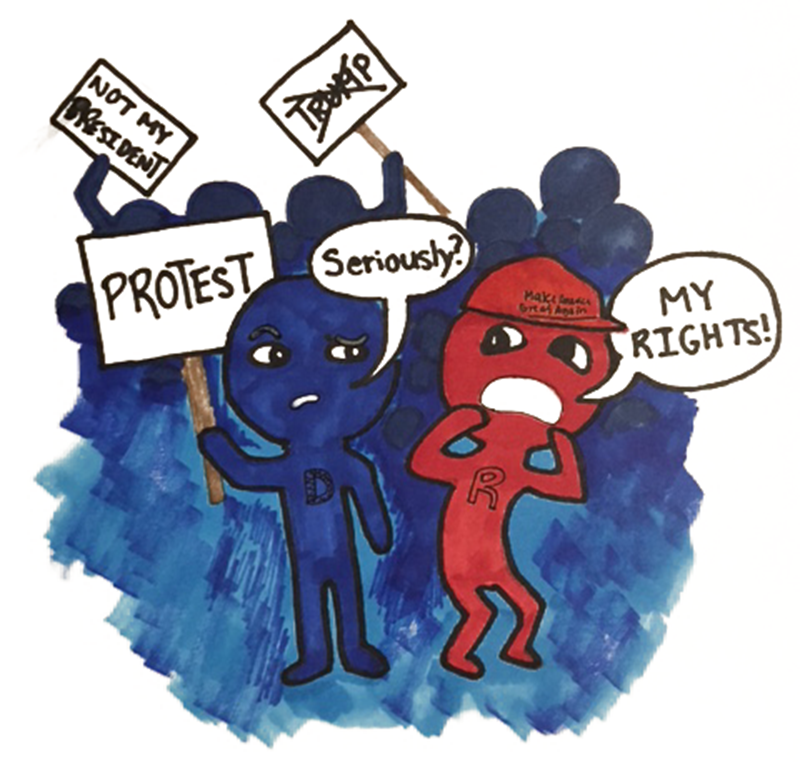A recent viral blog argues that it’s not right that millennial Republicans on liberal campuses “need to hide or downplay our satisfaction over our victory because of the fear that our opposing peers will label us.” Like many conservatives post-election, the writer feels as though she can’t express herself without being labeled as a sexist, bigot, or racist. These insults, she claims, force her to remain silent; she is afraid to express herself. “[Republicans] should feel safe in expressing their joy and optimism for the future of this country without the fear of being ostracized,” she writes.
With over 10,000 Facebook shares, it’s clear that her post has resonated with Trump supporters across the country. The prevailing narrative after the election is that liberals have lived in a bubble, heartlessly detached from the concerns of white, rural, and blue-collar voters. Many have called for “peace and understanding,” arguing that we must engage in civil dialogue if we want to move forward as a country. Conservatives are asking for their side to be heard, claiming that they are not racist or homophobic just because they voted Trump. Instead, they say, they were voting for economic prosperity and a more hardline stance against ISIS. These Trump supporters argue that liberals merely need to accept that the will of the majority has spoken; maybe, if Clinton supporters just worked hard enough to understand the other side, America could actually prosper under a Trump presidency.
This rhetoric highlights the truly otherworldly dimension we have entered since the election. Who ever thought it would be the Republicans calling for safe spaces where they can be free to express their ideas without name-calling or judgments? Isn’t it ironic that right-wingers are asking to not be ostracized based on their identity or political affiliation?
It reflects an astounding level of ignorance in these Trump supporters that they plead for acceptance and understanding after years of bashing and silencing minorities and their allies for demanding the same thing. What kind of collective amnesia must have taken place for so many conservatives to forget how they have treated minorities? How they have consistently sided with a corrupt and racist police force that has shot down hundreds of black men and women in cold blood? How they have told Mexicans and Muslims that they don’t belong and should go back to where they came from? How they have treated the transgender community—refusing to accept their gender identity and insisting that they will poison children’s minds simply by using the bathroom?
Of course, as this election’s 17-candidate Republican primary demonstrated, Republicans are hardly an ideologically unified group. Not all Republicans can be accused of adhering to all of these beliefs, but these issues nevertheless reflect a general apathy to the concerns of minorities. When minorities asked for basic sympathy, Republicans ignored their wishes. There was no acceptance. There was no reaching across party lines to try and understand a point of view different from their own. For Republicans to claim that they are now the marginalized, simply because people have rightfully accused them of racism and bigotry, is the incarnate of privilege. The lives of Trump supporters are not at stake. They don’t stand to lose their rights, to lose their health care, to be deported, to be placed on a national registry because they are seen as dangerous individuals in the eyes of the government.
If anything, Republicans’ blubbering and calls for peace show that they’re not equipped to handle opinions that differ from their own. By calling for peace and understanding, they are making the conversation about themselves, and silencing minorities and their rightful grievances in the process. Arguing that liberals should accept Trump because “the will of the people” elected him implicitly ignores all of the injustices minorities have had to face and will continue to face under a Trump presidency. They beg liberals for understanding while making absolutely no effort to understand any of the harsh realities a Trump presidency will entail for a large portion of the nation. Why should we work with you? Why should we even try and understand your point of view when it’s blatantly clear you have no interest in understanding ours?
Of course liberals will want to collectively mobilize, protest, and even block Trump supporters on Facebook. Conservatives have ignored us for so long, and complaining about the righteous backlash only proves that they have no intention of working with the progressive agenda and accommodating minorities. Only when the right shows a willingness to understand the other side and work toward compromise can progress be made. But, if conservatives are only asking to be understood so they can continue to espouse their bigoted rhetoric without fear of backlash, then there is little hope for a unified America.
Sarah Zimmerman is a fourth-year in the College majoring in English and a Viewpoints Editor.








